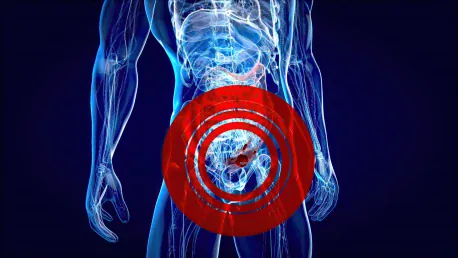In a groundbreaking move aiming to reshape the process of diagnosing colorectal cancer, the Community Diagnostic Centre (CDC) in Telford has launched a £1 million research study known as TRIOMIC. This innovative study is designed to significantly shorten the anxiety-inducing waiting period for a colorectal cancer diagnosis while reducing the reliance on invasive colonoscopies. By utilizing a less invasive test that collects rectal mucus through the Oricol™ device, researchers aim to identify abnormal cells indicative of cancer or significant polyps. If successful, this endeavor could ensure that 80% of patients receive a cancer-negative diagnosis within five days, thereby negating the need for a 45-minute colonoscopy that requires comprehensive bowel preparation and a hospital visit.
Innovative Testing Method
Enhancing Patient Experience
The implementation of this new testing method at Telford’s CDC marks a significant stride toward improving patient experiences. Approximately 6,000 symptomatic patients from The Shrewsbury and Telford Hospital NHS Trust (SaTH) are set to participate in this year-long study. Currently, patients often endure long waits and invasive procedures that add to their discomfort and anxiety. Reducing the reliance on traditional colonoscopies not only minimizes these issues but also allows for a more streamlined diagnostic process. This method removes the need for full bowel preparation, which can be a challenging and uncomfortable process for many individuals. Consequently, patients are expected to benefit from a much more pleasant and less stressful diagnostic experience.
Relieving Medical Staff and Reducing Costs
Beyond enhancing patient experiences, the new testing methodology also aims to alleviate the workload placed on the already overburdened medical staff. The traditional process of conducting colonoscopies is time-consuming and necessitates substantial resources, all of which contribute to the strain on medical personnel. By transitioning to the TRIOMIC study’s innovative testing approach, the SaTH can potentially reallocate its staff and resources more effectively, thereby optimizing hospital operations. Additionally, the financial burden associated with conventional diagnostic procedures can be substantially reduced. With SaTH currently facing annual costs of £3-5 million due to unnecessary colonoscopies, the TRIOMIC study’s success could translate to significant savings, enabling funds to be diverted to other critical areas within the healthcare system.
The TRIOMIC Study’s Structure
Funding and Infrastructure
The TRIOMIC study is generously funded by Origin Sciences, which covers both staff and capital costs associated with the initiative. In order to maintain a smooth operation, the study has established three clinic rooms within the CDC and has employed 14 staff members to manage various aspects of the research. A consultant is tasked with overseeing assessments and delivering results to ensure the highest level of accuracy and reliability. Origin Sciences’ investment underscores the importance of developing less invasive and more efficient cancer diagnostic methods. This funding ensures that the study is well-supported, providing the necessary resources and personnel to carry out its aims effectively.
Leading in Colorectal Cancer Diagnostics
As emphasized by Jon Lacy-Colson, a consultant colorectal surgeon and Chief Investigator for the trial, this initiative not only positions the Trust as a leader in colorectal cancer care but also introduces a novel model that relocates the diagnostic pathway into the CDC. This innovative approach eliminates the competition for space within acute hospitals, thereby optimizing the efficiency of diagnostics. Dr. John Jones, Medical Director at SaTH, highlighted the trial’s potential to establish a new gold standard for colorectal cancer diagnostics. By streamlining the diagnostic process, patients can avoid unnecessary tests and receive quicker reassurance or diagnoses, revolutionizing the current standard of care.
Potential Impact and Broader Implications
Addressing Colorectal Cancer Prevalence
With over 42,000 individuals affected annually by colorectal cancer in the UK and SaTH managing approximately 350 cases per year, the current system necessitates a more efficient approach. At present, more than 5,000 patients are discharged without requiring further action, and an additional 5,000 undergo a ‘normal’ colonoscopy. This high volume of procedures not only incurs substantial costs but also places an enormous strain on SaTH’s resources. The TRIOMIC study is poised to address these issues by offering a more streamlined and patient-friendly diagnostic pathway. By significantly reducing the number of unnecessary colonoscopies, the study could redefine colorectal cancer care, providing a model that could be emulated globally, setting new diagnostic standards.
Future Prospects and Global Implications
The Community Diagnostic Centre (CDC) in Telford has initiated a £1 million research project named TRIOMIC that is poised to transform the colorectal cancer diagnosis process. This pioneering study aims to drastically reduce the stress and waiting time associated with the diagnosis of colorectal cancer while also diminishing the dependence on invasive colonoscopies. Using the Oricol™ device, researchers will collect rectal mucus to identify aberrant cells that suggest cancer or significant polyps. If the study succeeds, 80% of patients could receive a negative cancer diagnosis within five days, eliminating the need for a traditional 45-minute colonoscopy, which involves thorough bowel preparation and a hospital visit. This effort represents a significant leap forward in patient care, providing quicker results with less discomfort and anxiety. The CDC’s groundbreaking work could set a new standard for how colorectal cancer diagnoses are conducted, potentially influencing worldwide practices in the medical community.









